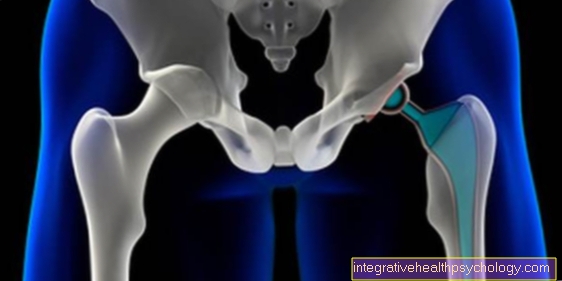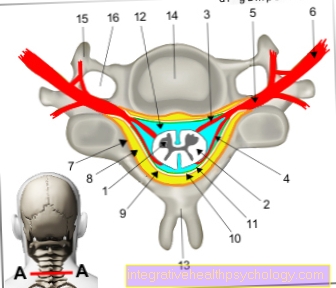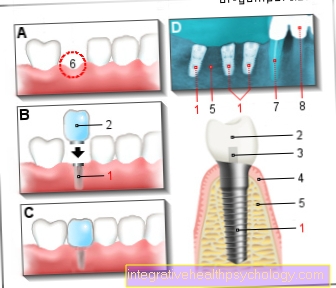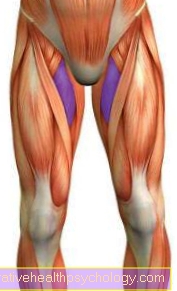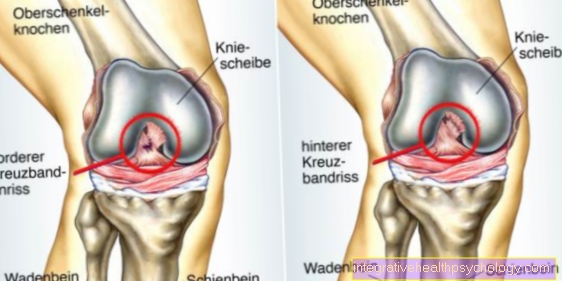Tongue inflammation
definition
Inflammation of the tongue is known as glossitis in medical terminology. Tongue inflammation mainly results in swelling, redness and pain in the area of the tongue. In addition to these symptoms, there may be visible changes in the lining of the tongue. The inflammation can be acute or chronic. In addition, it can occur as an accompanying symptom in the context of general illnesses.
People with a weakened immune system are more often affected, although the disease can in principle occur at any age.
Also read our topic: Tongue cancer

causes
There are many causes of tongue inflammation. A basic distinction is made between infectious causes and non-infectious causes. Infectious causes include: bacterial infections, fungal infections and infections that are caused by viruses. The group of non-infectious causes includes: Injuries to the tongue and the mucous membrane of the tongue from sharp-edged teeth or prostheses, complications after having a piercing, burns in the tongue area due to drinks or food that are too hot, and small bite injuries.
A lack of vitamins A, B and C, an iron deficiency (iron deficiency anemia) and a weakened immune system can also lead to inflammation of the tongue. General illnesses such as diabetes (diabetes mellitus), scarlet fever, HIV (AIDS) or reduced saliva production in the mouth (Sjogren's syndrome) are also causes.
Due to allergic reactions to certain foods, medicines or tooth fillings, discomfort and inflammation in the tongue area can occur. The constant consumption of cigarettes, alcohol, spicy mouthwashes and spicy dishes lead to additional chemical irritation of the tongue. Such permanent chemical irritation can lead to inflammation in the tongue and mouth area. Due to the diverse causes of the disease, the precise diagnosis is not always easy for the attending physician.
Symptoms
The predominant symptoms are pain, redness, and swelling around the tongue. These occur mainly in the area of the tip of the tongue and on the edges of the tongue. Other typical symptoms are burning tongue (glossodynia), disorders of the sense of taste, itching of the tongue mucous membrane (especially in allergic reactions), difficulty swallowing and sensitivity disorders of the tongue. Burning tongue often occurs during stress or together with mental illness.
You can find more information on the topic here:
- Burning tongue
- Burning at the tip of the tongue
With fungal infections, whitish, wipeable deposits form on the tongue mucous membrane. The formation of blisters on the tongue is also one of the symptoms of tongue inflammation.
An insect sting (wasp sting) can cause dangerous, severe swelling and reddening of the tongue in allergic, reactive people. Such a strong, rapid swelling of the tongue leads to a sudden, acute impairment of breathing and must be treated immediately as an emergency.
diagnosis
A thorough examination by the attending physician is extremely important, because only then can tongue inflammation be treated quickly and effectively.
At the beginning, the attending doctor examines the tongue and the lining of the tongue, paying particular attention to changes such as redness, swelling, plaque, etc. At the same time, general diseases as a cause of inflammation of the tongue should be safely excluded.
Blood tests are advisable if you suspect an allergic reaction or if you suspect a bacterial infection of the tongue. A vitamin or iron deficiency can also be detected by examining the blood. For a more precise diagnosis of a fungal infection, the doctor will take a swab of the lining of the tongue. This is then examined in a laboratory to precisely determine the fungal pathogen. Since tongue inflammation can occur due to sharp-edged teeth, fillings or poorly fitting dentures, it is recommended that a dentist clarify the dental status.
treatment
The treatment of tongue inflammation depends on the cause. Infectious causes are treated, depending on the form of the pathogen (bacteria, fungi or viruses), either with an antibiotic, a drug against fungal infestation (antimycotic) or with an agent against viruses. If the tongue inflammation occurs due to an allergic reaction, the triggering substances should be avoided.
At the same time, by prescribing cortisone preparations, the doctor can quickly resolve the allergic reaction. If the tongue is very swollen and red, sucking ice cubes or drinking cool, unsweetened drinks is recommended.
If there is a vitamin deficiency in the blood, this can be compensated for by changing your diet. Care should be taken to ensure that vitamins A, B and C are regularly supplied through food. For a short time, vitamin replacement preparations, in the form of effervescent tablets or in capsule form, can be taken if required.
If the blood test shows an iron deficiency, this can be compensated by the regular consumption of iron-containing red juices or with iron supplements from the pharmacy (Floradix). If tongue inflammation occurs as an accompanying symptom of general illnesses, these should be consistently diagnosed and treated. After successful treatment of the general disease, the inflammation of the tongue usually recedes quickly. Mouthwashes or teas made from chamomile, sage or peppermint are suitable to alleviate the symptoms. Taken regularly throughout the day, these remedies can quickly improve symptoms. For people with a weakened immune system, immune-boosting remedies from naturopathy can be used.
Basically you should avoid spicy foods, hot drinks, alcohol and cigarettes during the treatment, as all of them lead to additional chemical irritation of the tongue. Thorough oral hygiene is essential.
Duration
The duration of tongue inflammation depends on the cause of the disease. The tongue inflammation and its symptoms usually resolve within a few days after starting treatment. If a general disease is treated successfully, the inflammation of the tongue as an accompanying symptom also quickly recedes.
In order to keep the duration of tongue inflammation as short as possible, the patient should take care to protect the tongue and the tongue mucosa. If the disease persists for a longer period of time, the tongue and the lining of the tongue can recede due to the permanent inflammation.
With a cold
A cold can cause changes in the lining of the tongue that are similar to symptoms of tongue inflammation. A cold and most infections of the nose and throat are caused by viruses that can form gray-white coatings on the lining of the tongue. At the same time, a cold can lead to taste disturbances and sensory disturbances orSensory disorders of the tongue. These symptoms resolve completely after the cold has subsided
Treatment with home remedies
In addition to medication, so-called home remedies can help alleviate the symptoms. The classic home remedies include tinctures, mouthwashes or teas made from sage, chamomile, fennel or peppermint. Tinctures made from myrrh, which are applied to the lining of the tongue, can be used for tongue inflammation or general inflammation of the mouth and throat.
Homeopathic and naturopathic medicines are useful to strengthen the immune system. These are usually administered under the tongue (sublingually). The active ingredient of marshmallow leaves and marshmallow roots can alleviate the symptoms. Marshmallow leaves and roots are mostly used in the form of juices or syrup. If the tongue is very swollen and red, sucking ice cubes and drinking cold, unsweetened drinks can help.
Smoke
Smoking should be avoided if possible during tongue inflammation in order to prevent additional irritation of the tongue. At the same time, smoking and its components lead to delayed, more difficult wound healing in the entire mouth and throat area. Instead of smoking, thorough oral hygiene, protection of the mucous membranes and a balanced, vitamin-rich diet should be in the foreground.







